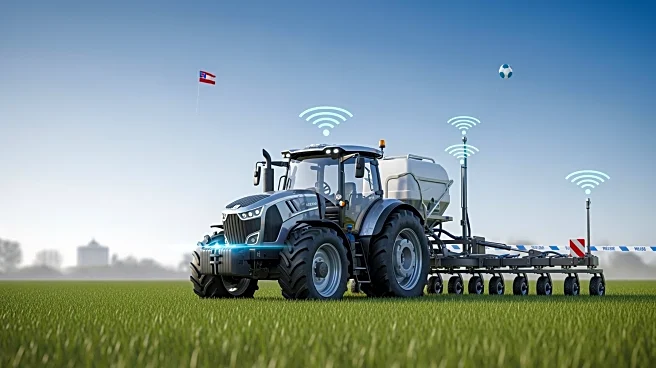What's Happening?
Case IH has introduced advancements in precision technology aimed at enhancing farming operations. The company has updated its FieldOps platform with AI Boundary Creation, which utilizes satellite imagery and machine learning to generate field boundaries
efficiently. This innovation is designed to save time and improve data consistency across farming equipment. Additionally, Case IH has launched SenseApply technology, which offers versatile and economical variable rate application solutions. This technology includes a multi-spectral camera for precise field imaging and provides lifetime access to Live VRA, reducing herbicide usage by up to 60%. These updates are part of Case IH's strategy to integrate innovative solutions into existing farming operations, thereby increasing efficiency and profitability for operators.
Why It's Important?
The advancements by Case IH are significant for the agricultural industry as they promise to enhance operational efficiency and profitability. By integrating AI and machine learning into farming practices, operators can achieve more precise and consistent results, reducing waste and optimizing resource use. The reduction in herbicide usage not only lowers costs but also contributes to more sustainable farming practices. These technologies can potentially transform the agricultural landscape by enabling farmers to manage their operations more effectively, leading to increased yields and better resource management. As the industry faces challenges such as climate change and resource scarcity, such innovations are crucial for ensuring food security and sustainable agricultural practices.
What's Next?
Case IH plans to showcase its precision technology solutions at Agritechnica, a major agricultural trade fair, where industry stakeholders can learn more about these innovations. The company is also focusing on expanding its support tools to address common operator challenges, indicating ongoing development and integration of new technologies. As these solutions gain traction, other agricultural equipment manufacturers may follow suit, leading to broader adoption of AI-driven technologies in farming. This could result in a shift towards more data-driven and efficient agricultural practices across the industry.
Beyond the Headlines
The integration of AI in agriculture raises questions about the future of farming jobs and the skills required for operators. As technology becomes more prevalent, there may be a need for training programs to equip farmers with the necessary skills to utilize these advanced systems effectively. Additionally, the ethical implications of AI-driven farming, such as data privacy and the impact on small-scale farmers, warrant consideration as the industry evolves.















